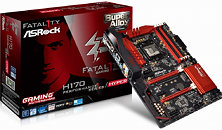- Joined
- Oct 9, 2007
- Messages
- 47,783 (7.40/day)
- Location
- Dublin, Ireland
| System Name | RBMK-1000 |
|---|---|
| Processor | AMD Ryzen 7 5700G |
| Motherboard | Gigabyte B550 AORUS Elite V2 |
| Cooling | DeepCool Gammax L240 V2 |
| Memory | 2x 16GB DDR4-3200 |
| Video Card(s) | Galax RTX 4070 Ti EX |
| Storage | Samsung 990 1TB |
| Display(s) | BenQ 1440p 60 Hz 27-inch |
| Case | Corsair Carbide 100R |
| Audio Device(s) | ASUS SupremeFX S1220A |
| Power Supply | Cooler Master MWE Gold 650W |
| Mouse | ASUS ROG Strix Impact |
| Keyboard | Gamdias Hermes E2 |
| Software | Windows 11 Pro |
ASRock is implementing a novel workaround to Intel's recent base-clock overclocking restrictions for its 6th generation Core "Skylake" processors. The company announced the Fatal1ty H170 Gaming K4 HYPER and Fatal1ty B150 Gaming K4 HYPER motherboards, which are based on a common PCB, but differ with chipset - H170 Express and B150 Express. The two use an external clock-generator chip to give cadence to the CPU, circumventing the on-die clock-generator Intel has been using for the past several generations of Core processor chipsets.
With this contraption, you can increase base clock frequency on non-K Core processors in fine increments of 0.0625 MHz, as well as tweak memory clock. Its star attraction aside, the two "HYPER" series motherboards offer mid-range feature-sets, that are nearly identical to those of the Fatal1ty H170 Gaming K4 and the Fatal1ty B150 Gaming K4 boards.



View at TechPowerUp Main Site
With this contraption, you can increase base clock frequency on non-K Core processors in fine increments of 0.0625 MHz, as well as tweak memory clock. Its star attraction aside, the two "HYPER" series motherboards offer mid-range feature-sets, that are nearly identical to those of the Fatal1ty H170 Gaming K4 and the Fatal1ty B150 Gaming K4 boards.



View at TechPowerUp Main Site






